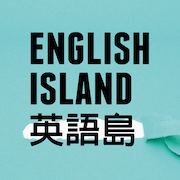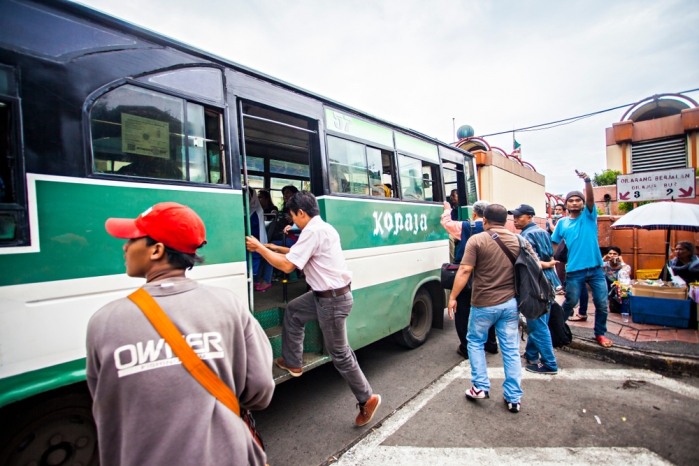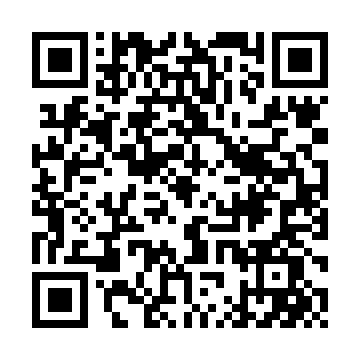
印尼「塑膠公車」用垃圾當車票
Trash for tickets on Indonesia’s ‘plastic bus’
Ndtv.com #environment #recycle #garbage #indonesia

(雅加達公車,此圖為示意圖)
Dozens of people clutching bags full of plastic bottles and disposable cups queue at a busy bus terminal in the Indonesian city of Surabaya -- where passengers can swap trash for travel tickets.
在印尼泗水市一個繁忙的公車總站,數十名乘客手持裝滿塑膠瓶和一次性杯子的袋子在排隊,他們可以用垃圾換取車票。
The nation is the world's second-biggest marine polluter and has pledged to reduce plastic waste in its waters some 70 percent by 2025 by boosting recycling, raising public awareness, and curbing usage.
印尼是全球第二大海洋污染國,但該國承諾到2025年,通過加強回收利用、提高公眾意識和限制使用,將海域內的塑膠垃圾降低約七成。
The Surabaya scheme has been a hit in the city of 2.9 million, with nearly 16,000 passengers trading trash for free travel each week, according to authorities.
印尼當局稱,「泗水計畫」在這座290萬人口的城市大受歡迎,每週有近1.6萬名乘客用垃圾換車票。
"This is a very smart solution. It's free and instead of throwing away bottles people now collect them and bring them here," explains 48-year-old resident Fransiska Nugrahepi.
「這是一個非常聰明的解決方案。車票可以免費換取,現在人們不再把瓶子扔掉,而是把它們收集起來帶到這兒,」48歲的居民法蘭西斯卡解釋說。
An hour-long bus ride with unlimited stops costs three large bottles, five medium bottles or 10 plastic cups. But they must be cleaned and cannot be squashed.
一小時不限站的公車票需要用3個大瓶子、5個中號瓶子或10個塑膠杯來換取。但瓶子必須先清洗,且不能被壓扁。
Franki Yuanus, a Surabaya transport official, says the programme aims not only to cut waste but also to tackle traffic congestion by encouraging people to switch to public transit.
泗水交通官員元努斯表示,這個專案不但減少浪費,還為了鼓勵人們乘坐大眾運輸,解決了交通擁堵問題。
"There has been a good response from the public," insists Yuanus, adding: "Paying with plastic is one of the things that has made people enthusiastic because up until now plastic waste was just seen as useless."
元努斯說:「民眾反響不錯。用塑膠瓶付款是讓人們熱情高漲的原因之一,因為在此之前,人們認為塑膠垃圾毫無用處。」
Currently the fleet consists of 20 near-new buses, each with recycling bins and ticket officers who roam the aisles to collect any leftover bottles.
目前,車隊由20輛幾乎全新的公車組成,每輛公車都配有回收箱和驗票員,驗票員會在車廂過道裡來回走動,收集剩餘的瓶子。
Authorities said roughly six tons of plastic rubbish are collected from passengers each month before being auctioned to recycling companies.
當局表示,每月能從乘客那裡收集到大約6噸塑膠垃圾,之後會把垃圾賣給回收公司。
Nurhayati Anwar, who uses the bus about once a week with her three-year-old son, said the trash swap programme is changing how people see their throwaway cups and bottles.
努爾哈亞蒂和她三歲的兒子大約每週乘坐一次公車。她說,垃圾換車票項目正在改變人們對一次性杯子和瓶子的看法。
"Now people in the office or at home are trying to collect (rubbish) instead of just throwing it away,” the 44-year-old accountant told AFP after trading in several bottles for a free ride.
在用幾個瓶子換取了一張車票後,這位44歲的會計師對法新社說:「現在人們在辦公室或家裡都在收集垃圾,而不是直接把垃圾扔掉。」
"We now know that plastic is not good for the environment -- people in Surabaya are starting to learn."
「我們現在知道塑膠不環保,泗水的人們開始意識到這一點。」
Other parts of Indonesia, an archipelago of some 17,000 islands, are also trying to tackle the issue.
除了印尼的部分地區,包含了將近一萬七千多個小島的群島區,也正在嘗試解決這個問題。
繼續讀:
3. 艾瑪·華森:如果生命給你一顆檸檬,你就把它拿來做成一杯檸檬汁吧
編輯/英語島編輯部
本文收錄於英語島English Island 2019年12月號
訂閱雜誌
| 加入Line好友 |  |

 擔心生理健康,心理卻出問題?
擔心生理健康,心理卻出問題?